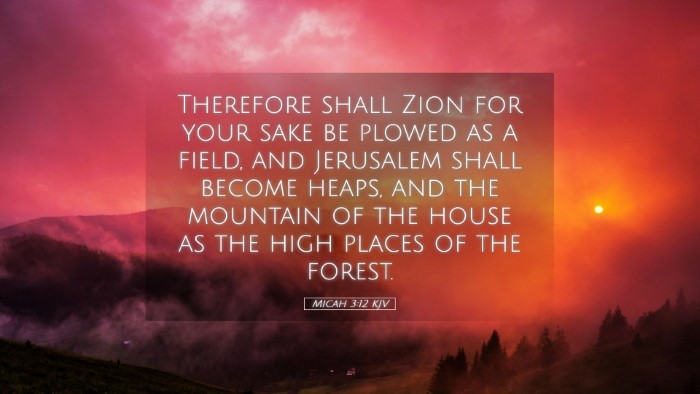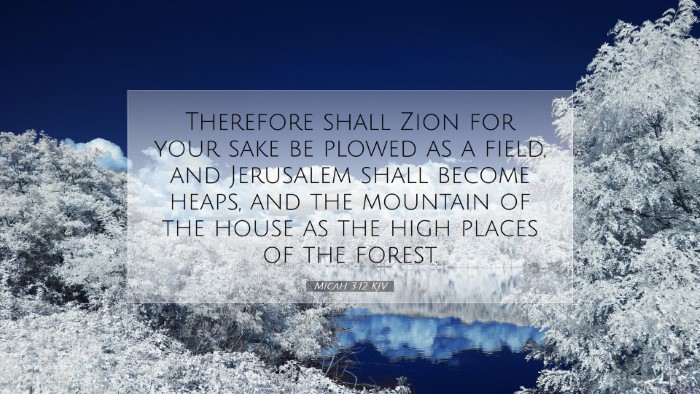Old Testament
Genesis Exodus Leviticus Numbers Deuteronomy Joshua Judges Ruth 1 Samuel 2 Samuel 1 Kings 2 Kings 1 Chronicles 2 Chronicles Ezra Nehemiah Esther Job Psalms Proverbs Ecclesiastes Song of Solomon Isaiah Jeremiah Lamentations Ezekiel Daniel Hosea Joel Amos Obadiah Jonah Micah Nahum Habakkuk Zephaniah Haggai Zechariah MalachiMicah 3:12
Micah 3:12 KJV
Therefore shall Zion for your sake be plowed as a field, and Jerusalem shall become heaps, and the mountain of the house as the high places of the forest.
Micah 3:12 Bible Commentary
Commentary on Micah 3:12
Bible Verse: Micah 3:12 – "Therefore shall Zion for your sake be plowed as a field, and Jerusalem shall become heaps, and the mountain of the house as the high places of the forest."
Contextual Overview
The Book of Micah is a prophetic text conveying God's message of both warning and hope. Micah, a contemporary of Isaiah, prophesies during a time when Israel faced impending judgment due to their social injustices and failure to adhere to God's covenant. This particular verse highlights the dire consequences of sin and rebellion against God and serves as a stark reminder of the seriousness of covenant unfaithfulness.
Analysis of Key Themes
-
Punishment and Judgment:
Micah 3:12 serves as a prophetic declaration of the destruction that would come upon Zion and Jerusalem as a result of the people's unfaithfulness. Matthew Henry underscored that the destruction symbolized by Zion being "plowed as a field" conveys complete devastation and loss of identity. The imagery points to a reversal of fortune, where sacred spaces are treated as common, with profound implications for the people of God.
-
God's Sovereignty:
This verse emphasizes the sovereignty of God in orchestrating judgment. Albert Barnes notes that the destiny of both Zion and Jerusalem is under God’s control. The necessary consequence of sin is seen as originating from divine will, demonstrating that the Lord is both compassionate and just in His governance.
-
Hope Amidst Desolation:
While the verse paints a grim picture, it also serves as a call to repentance. Adam Clarke points out that God's intention is never purely punitive; thus, it presupposes the possibility of restoration. The severe consequences serve to convict the hearts of the people, leading them back to God who desires their return to a righteous path.
Literary Devices
Micah employs vivid imagery in this passage, which serves to evoke a strong emotional response from the audience. The metaphor of Zion being "plowed as a field" reflects not only physical destruction but also the agricultural aspect of hope and regeneration, as fields can eventually bear fruit. This duality exemplifies the complexity of God's justice and mercy.
The contrast between the present state of Jerusalem and its anticipated desolation engages the reader's imagination and reinforces the urgency for repentance. The historical context provided by the verses preceding Micah 3:12 highlights the corruption of leaders and the societal injustices that lead to such impending judgment.
Theological Implications
This verse invites deep theological reflection on the nature of sin, justice, and redemption. The plowing of Zion represents the consequences of neglecting covenant responsibilities, drawing attention to the relationship between God and His people. It reminds pastoral leaders, students, theologians, and biblical scholars of the importance of genuine faith and adherence to God's commands which foster community integrity.
Furthermore, this verse connects to broader biblical themes of restoration and hope. The harsh judgments throughout Scripture often act as a precursor to divine restoration, thereby reaffirming God’s unending covenant love for His people. This tension between judgment and grace encapsulates the essence of the gospel narrative.
Practical Applications
-
Call to Reflection:
Pastors are encouraged to contemplate the implications of this verse for their congregations. Micah’s message serves as a reflection on the current state of the church and its leaders, calling for self-examination concerning integrity and social justice.
-
Encouragement for Repentance:
This passage can be instrumental in preaching repentance. The stark warning embedded in Micah 3:12 can challenge the faithful to seek genuine transformation in their lives and communities.
-
Understanding Consequence and Forgiveness:
Students and scholars are urged to grapple with the dual themes of consequence and forgiveness presented in this text. A nuanced understanding of God's justice and mercy can enrich theological discourse and foster a holistic approach to biblical studies.
Conclusion
In summary, Micah 3:12 is a poignant reminder of the serious nature of sin and the resulting judgment that God, in His sovereignty, pronounces. However, within the justice rendered, the prospect of restoration remains a beacon of hope for all who turn back to Him. Engaging deeply with this verse allows pastors, students, theologians, and Bible scholars to explore the richness of God's character, His commitment to justice, and the invitation to redemption offered to His people.


